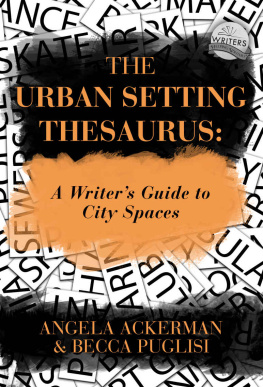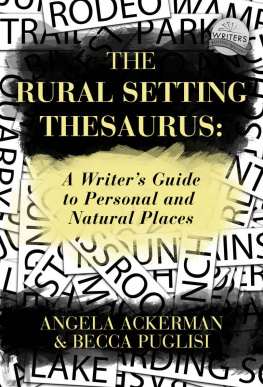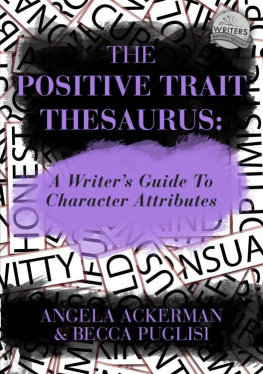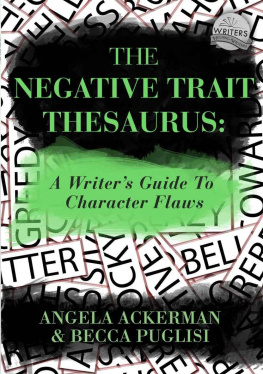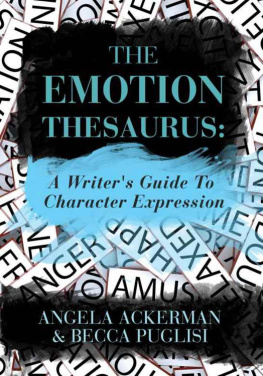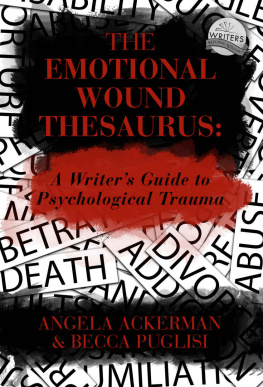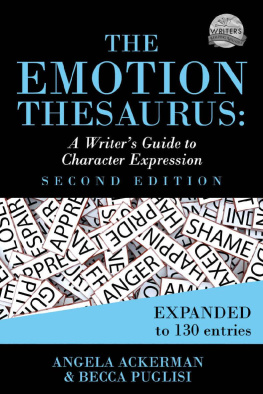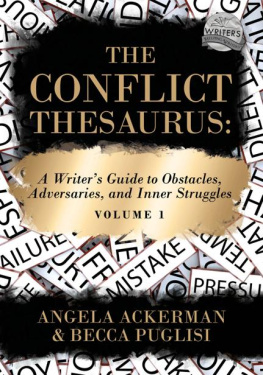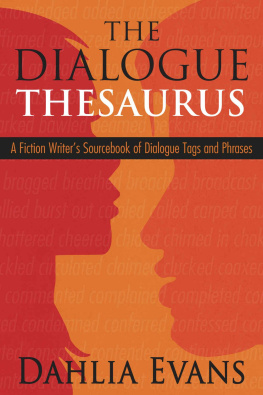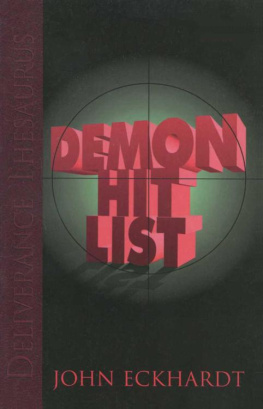Angela Ackerman - The Urban Setting Thesaurus: A Writer’s Guide to City Spaces
Here you can read online Angela Ackerman - The Urban Setting Thesaurus: A Writer’s Guide to City Spaces full text of the book (entire story) in english for free. Download pdf and epub, get meaning, cover and reviews about this ebook. year: 0, genre: Home and family. Description of the work, (preface) as well as reviews are available. Best literature library LitArk.com created for fans of good reading and offers a wide selection of genres:
Romance novel
Science fiction
Adventure
Detective
Science
History
Home and family
Prose
Art
Politics
Computer
Non-fiction
Religion
Business
Children
Humor
Choose a favorite category and find really read worthwhile books. Enjoy immersion in the world of imagination, feel the emotions of the characters or learn something new for yourself, make an fascinating discovery.
- Book:The Urban Setting Thesaurus: A Writer’s Guide to City Spaces
- Author:
- Genre:
- Year:0
- Rating:5 / 5
- Favourites:Add to favourites
- Your mark:
- 100
- 1
- 2
- 3
- 4
- 5
The Urban Setting Thesaurus: A Writer’s Guide to City Spaces: summary, description and annotation
We offer to read an annotation, description, summary or preface (depends on what the author of the book "The Urban Setting Thesaurus: A Writer’s Guide to City Spaces" wrote himself). If you haven't found the necessary information about the book — write in the comments, we will try to find it.
The Urban Setting Thesaurus: A Writer’s Guide to City Spaces — read online for free the complete book (whole text) full work
Below is the text of the book, divided by pages. System saving the place of the last page read, allows you to conveniently read the book "The Urban Setting Thesaurus: A Writer’s Guide to City Spaces" online for free, without having to search again every time where you left off. Put a bookmark, and you can go to the page where you finished reading at any time.
Font size:
Interval:
Bookmark:
THE URBAN SETTING
THESAURUS:
A Writers Guide to City Spaces
Angela Ackerman
Becca Puglisi

MORE WRITERS HELPING WRITERS BOOKS
The Emotion Thesaurus: A Writers Guide to Character Expression
The Positive Trait Thesaurus: A Writers Guide to Character Attributes
The Negative Trait Thesaurus: A Writers Guide to Character Flaws
The Rural Setting Thesaurus: A Writers Guide to Personal and Natural Spaces
Copyright 2016 by Angela Ackerman & Becca Puglisi
All rights reserved
Writers Helping Writers
First print edition, June 2016
ISBN: 978-0-9897725-8-7
No part of this publication may be reproduced or distributed in print or electronic form without prior permission of the authors. Please respect the hard work of the authors and do not participate in or encourage the piracy of copyrighted materials.
Edited by: C. S. Lakin and Michael Dunne
Book cover design by: Scarlett Rugers Design 2016
EBook formatting by: Polgarus Studio
ABOUT THE AUTHORS
Angela Ackerman and Becca Puglisi are bestselling authors, writing coaches, and international speakers. Their books are available in five languages, are sourced by US universities, and are used by novelists, screenwriters, editors, and psychologists around the world. Angela and Becca also co-founded their popular Writers Helping Writers site, a hub where authors can hone their craft, as well as One Stop for Writers, an innovative online library built to help writers elevate their storytelling.
DEDICATIONS
To every writer who ever dreamed, and then had the courage to follow that dream wherever it led.
And especially to Lee, for not using the ants.

Wish you had a powerhouse writing resource at your fingertips that could save you valuable time while elevating your storytelling? One Stop for Writers might just be the answer. Brought to you by Becca and Angela, the authors of this and other bestselling writing books, along with Lee Powell, the creator of Scrivener for Windows, the One Stop online library is the resource youve been searching for.
Our unique thesaurus collection covers emotions, settings, weather, characterization, symbolism, and other elements of description, and will help set your book apart by bringing the fresh imagery and deeper meaning that your readers crave. Along with an array of unique tools, tutorials, structure maps, timelines, and generators, you can also plan and organize your writing like never before.
Stop by sometime if you like; registration is always free.





PRAISE FOR THE EMOTION THESAURUS
One of the challenges a fiction writer faces, especially when prolific, is coming up with fresh ways to describe emotions. This handy compendium fills that need. It is both a reference and a brainstorming tool, and one of the resources I'll be turning to most often as I write my own books.
~ James Scott Bell, best-selling author of Deceived and Plot & Structure
PRAISE FOR THE POSITIVE AND NEGATIVE TRAIT THESAURUS BOOKS
In these brilliantly conceived, superbly organized and astonishingly thorough volumes, Angela Ackerman and Becca Puglisi have created an invaluable resource for writers and storytellers. Whether you are searching for new and unique ways to add and define characters, or brainstorming methods for revealing those characters without resorting to clichs, it is hard to imagine two more powerful tools for adding depth and dimension to your screenplays, novels or plays.
~ Michael Hauge, Hollywood script consultant and story expert , author of Writing Screenplays That Sell
Table of Contents
THE GIANT MISCONCEPTION: WHO CARES ABOUT THE SETTING?
When discussing the bones of structure for strong storytelling, certain elements always get top billing. Characters, for example, usually crest the food chain, and rightfully soas they and their emotions are the beating heart of any story. The hero in particular is what draws a reader in, as his inner world is a complex landscape of needs, desire, fears, and the hope that some greater fulfillment might be his. Readers empathize with the protagonists journey of self-discovery as he conquers obstacles on the road to his goal. They also cheer at each achievement that gets the main character closer to that place where he feels satisfied and complete.
The red carpet is also rolled out for plot, because without outer events to shape the heros path (providing opposition and opportunity as he chases his goal), readers are left with a character who wanders aimlessly and without purpose.
Plot and characterization are the two titans of storytellingthere is no doubt. Other important elements often taught by editors and story coaches tie into these heavyweights: voice, pacing, conflict, theme, description, and dialogue.
But what about the setting? Where does it fit in on the importance scale?
Thats a good question. Newer writers sometimes make the mistake of assuming that the setting is no more than a backdrop for a storys events; its a necessary part, but its not important enough to waste too many words describing, and its definitely not worth stressing over when it comes to choosing the right one for a scene.
Of course, this type of thinking is the downfall of many writers because, while its often overlooked, the setting is, in fact, a powerhouse of storytelling description that deepens every scene. Not only does it anchor the reader in events as they unfold, but, chosen carefully, the right setting can help characterize the storys cast, deliver backstory in a way that enriches, convey emotion, supply tension, and accomplish a host of other things to give readers a one-of-a-kind experience. In fact, out of all the ingredients that make a compelling story, setting is one of the most versatile yet often underutilized.
Why is this? Simple: its due to a misconception that readers arent interested in the setting and will skip right over descriptive passages. Because of this, writers often dont look beneath the surface to see what a setting can truly do; they miss out on all the ways it can shine a light on a characters mind-set and add depth to the bigger story. Instead, they focus on giving only enough setting detail to provide context for the reader. And while context is important to provide a sense of place, its only a sliver of what the setting brings to the storytelling table.
Describing a setting does come with challenges. Finding the perfect balance of showing and telling that wont slow the pace can be tricky. An avalanche of description may cause readers to skip ahead, but we also dont want to provide so little that they have to work hard to visualize the scene. If mounting frustration over being unable to imagine the characters world reaches a critical point, the book cover may close and never reopen.
Font size:
Interval:
Bookmark:
Similar books «The Urban Setting Thesaurus: A Writer’s Guide to City Spaces»
Look at similar books to The Urban Setting Thesaurus: A Writer’s Guide to City Spaces. We have selected literature similar in name and meaning in the hope of providing readers with more options to find new, interesting, not yet read works.
Discussion, reviews of the book The Urban Setting Thesaurus: A Writer’s Guide to City Spaces and just readers' own opinions. Leave your comments, write what you think about the work, its meaning or the main characters. Specify what exactly you liked and what you didn't like, and why you think so.

